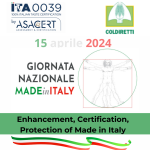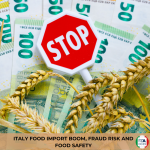The Russian market represents 1.5% of Italian exports and 3% of imports of goods, with over 11,000 companies involved.
With international sanctions and export restrictions implemented because of the Russian-Ukrainian conflict, Italy has seen on the one hand a suspension of imports from Ukraine of meat, rye, oats, buckwheat, sugar, millet and salt and, on the other hand, an important risk for exports of agri-food products, which had already suffered considerable damage following the embargo decree instituted by Russia in 2014.
The suspension of the import of Ukrainian products, adopted to guarantee internal stocks, is a very serious problem for all Italian farms (1 farm out of 4) that mostly use Ukrainian corn and wheat to feed their livestock . The supply of agricultural fertilizers is also at risk, given that Russia is the largest producer.
Italy is in a particularly weak condition, since it produces just 36% of the soft wheat it needs, 53% of corn, 56% of durum wheat for pasta and 73% of barley. About the live-stock, the self-supply of beef covers 51% of the total needed, while for pork the percentage rises to 63% and drops to 49% for cured meats, goat and sheep meat. For milk and cheese, self-sufficiency reaches 84%*.
Everything that cannot be produced in Italy comes from abroad. Thus, due to the conflict, many of the Italian agri-food establishments risk experiencing an unprecedented crisis, aggravated by the problems experienced by trade flows and by the risk of the loss of raw materials from Russia, such as fertilizers.
On the other hand, the stop on imports adopted by Russia in relation to goods produced by Italy, officially registered by the Kremlin in the black list of countries with which to interrupt trade relations, will lead to serious repercussions for Made in Italy. In all likelihood, this phenomenon will fuel the spread of fake Italian products, through which market gaps are filled by introducing goods produced in Russia and other countries and also exploiting the Italian Sounding phenomenon , where russian products are passed off as Italians.
But that’s not all: due to the limitations imposed on Italy, many of the Italian businesses on Russian territory risk losing the supply of Made in Italy raw materials altogether.
“In crisis situations like this one decisive action in support of the protection of Made in Italy is increasingly essential. Italian people thrive on conviviality and ITA0039 was born and is committed to defending, promoting and enhancing Italianness across the border, together with the human values it brings with it – The words of Fabrizio Capaccioli ASACERT Director and creator of the ITA0039 Protocol – We hope for a resolution of international disputes for the peaceful coexistence and prosperity of people, nations and the lives of millions of citizens admirers of Made in Italy also in the East. ”
*source: Coldiretti






